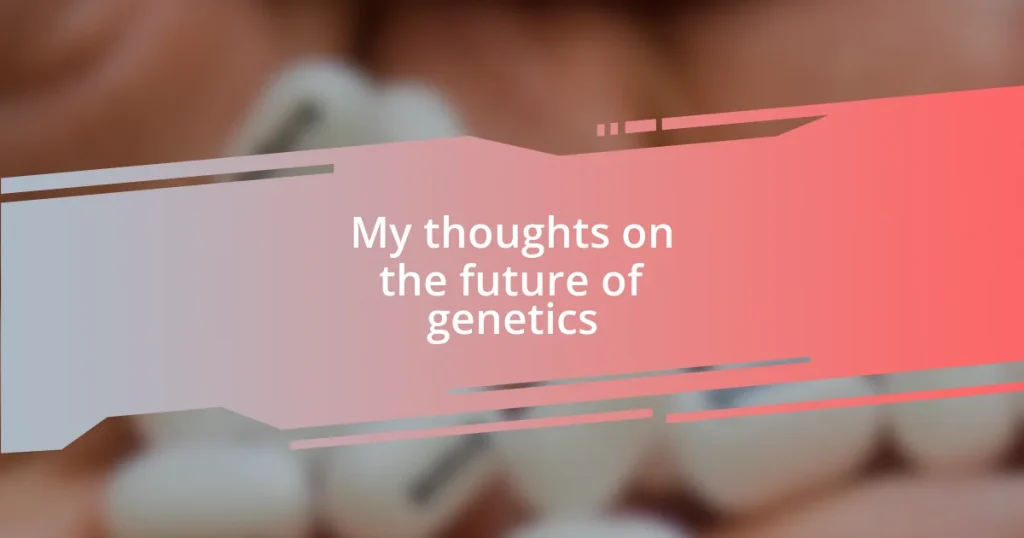Key takeaways:
- CRISPR technology has transformed genetic engineering, promising advancements in preventing genetic diseases and enhancing agricultural practices.
- Ethical considerations, including the potential misuse of genetic technology and the importance of informed consent, are critical as genetic research evolves.
- Future challenges include ensuring equitable access to genetic therapies, addressing data privacy concerns, and navigating the ethics of gene editing, particularly in humans.
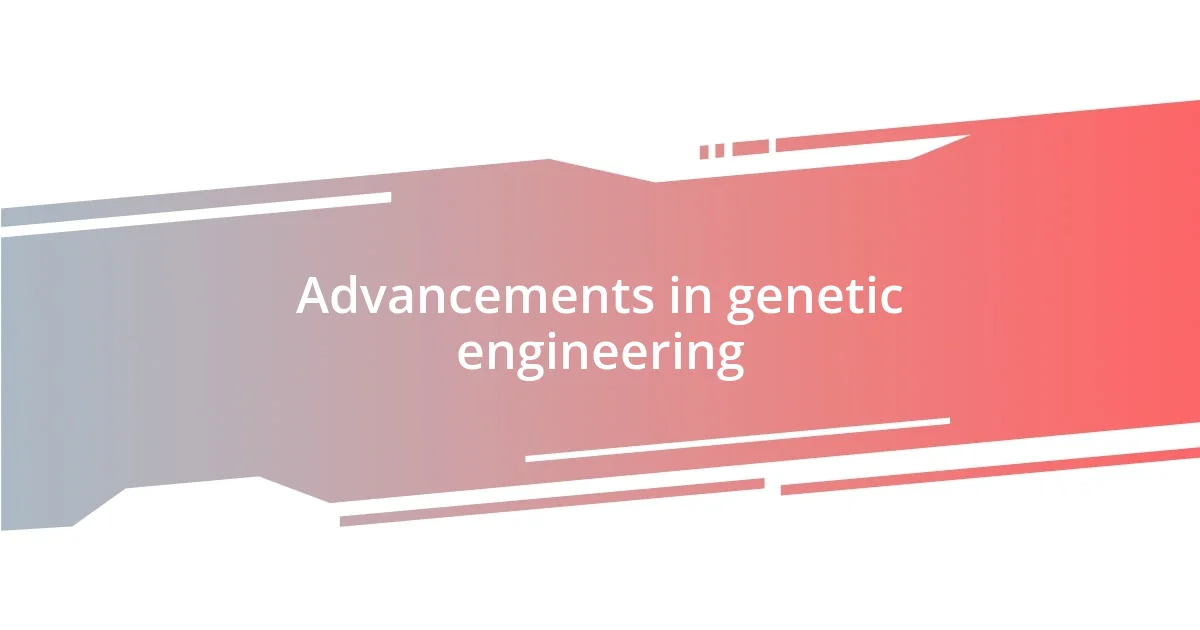
Advancements in genetic engineering
I’ve been following the field of genetic engineering for quite some time now, and the pace of advancements never ceases to amaze me. For instance, CRISPR technology has revolutionized our ability to edit genes with unprecedented precision. It’s fascinating to consider how this tool could potentially eradicate genetic diseases that have plagued families for generations—can you imagine the relief for parents knowing they could prevent their child from inheriting a serious condition?
One area that particularly strikes a chord with me is the use of genetic engineering in agriculture. I remember visiting a local farm that had adopted genetically modified crops. The farmer shared how these innovations not only increased yields but also allowed them to use fewer pesticides. It was emotional to see how technology helps sustain their livelihood while contributing to food security in our world. Isn’t it incredible how advancements in one field have the potential to create a ripple effect across so many others?
Moreover, the ethical implications of these advancements are worth pondering. As I reflect on the rapid evolution of gene editing, I can’t help but ask: where do we draw the line? With powerful tools at our disposal, it’s crucial to engage in dialogue about the responsible use of this technology. Balancing innovation with ethical considerations will be key as we chart our course into the future of genetics.
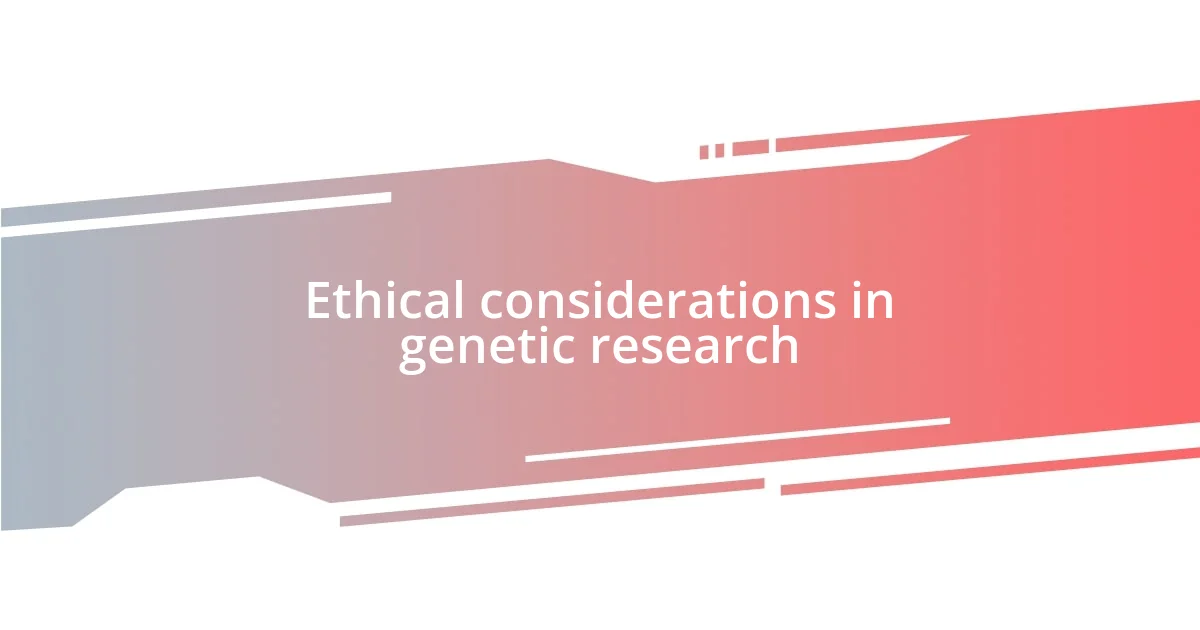
Ethical considerations in genetic research
When considering genetic research, one of the foremost ethical challenges is the potential for misuse. I recall a conversation with a colleague who works in genetic diagnostics. We discussed the possibility of gene editing being used for non-therapeutic enhancements, like selecting physical traits or intelligence. This notion unsettles me; it raises the question of whether we might be venturing into a realm where the “perfect” human exists. The implications of such abilities could exacerbate social inequalities, leaving marginalized communities even further behind.
Another critical aspect is informed consent, particularly in cases involving genetic testing. In my experience, individuals often don’t fully grasp the ramifications of knowing their genetic predispositions. A friend underwent genetic testing for a hereditary condition, and while the results were enlightening, they also burdened him with anxiety about the future. This personalization of health risks underscores the importance of ensuring that individuals are adequately informed. It is vital to foster an environment where patients can make choices with respect to their genetic information, enabling autonomy rather than contributing to fear or uncertainty.
Finally, the role of regulatory frameworks in genetic research cannot be understated. I’ve seen the inherent value in having robust ethical guidelines to govern studies. In my earlier days working with research teams, we adhered strictly to protocols that ensured participant safety and data integrity. These experiences solidified my belief that strict oversight is essential to prevent exploitation and ensure that benefit-sharing is prioritized. As we delve deeper into genetic science, fostering transparency will help build public trust and enhance the overall impact of our discoveries.
| Ethical Considerations | Description |
|---|---|
| Misuse of Technology | Potential for gene editing to be used for non-therapeutic enhancements, leading to societal inequalities. |
| Informed Consent | Importance of individuals understanding the implications of genetic testing and having autonomy over their decisions. |
| Regulatory Frameworks | The need for robust ethical guidelines to govern genetic research and maintain public trust. |
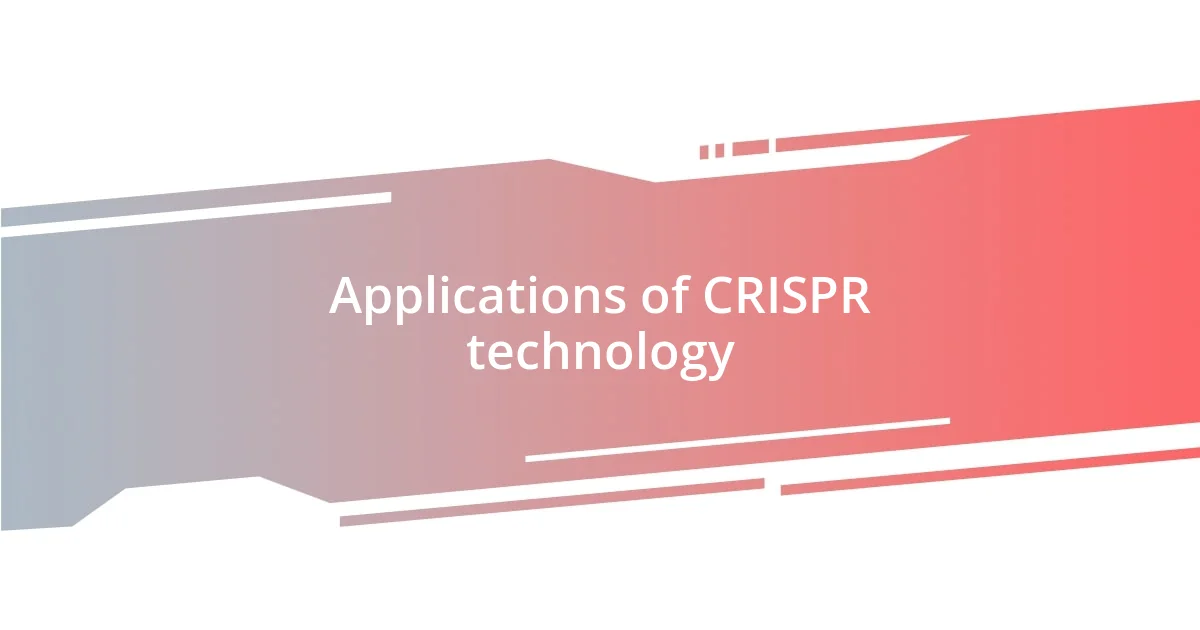
Applications of CRISPR technology
I’m truly excited by the potential applications of CRISPR technology. One of the most promising areas is in the realm of medicine. I remember reading about a groundbreaking study where researchers used CRISPR to target and modify genes responsible for inherited disorders. Seeing how this technology could potentially transform lives gave me goosebumps; the thought of alleviating suffering caused by genetic conditions feels like a real turning point in medicine. Imagine parents watching their children grow up without the shadow of these diseases hanging over them—it’s inspiring.
Here’s a brief overview of CRISPR’s key applications:
- Gene Therapy: Correcting faulty genes to treat genetic disorders, such as cystic fibrosis or sickle cell anemia.
- Agricultural Biotechnology: Enhancing crop resilience to pests and diseases, improving food security while minimizing chemical use.
- Drug Development: Accelerating the process of developing new drugs by identifying the genetic basis of diseases.
- Biotechnology Research: Enabling scientists to better understand gene function and interactions, leading to new biological insights.
- Synthetic Biology: Creating new organisms or modifying existing ones for specific purposes, like producing biofuels or pharmaceuticals.
The agricultural sector holds some of the most remarkable prospects for CRISPR technology. During a recent event, I had a chance conversation with a biotechnologist who shared compelling stories of farmers adopting CRISPR-enhanced crops. These modifications not only helped to increase yield but also made plants more resilient to climate change. I felt a rush of hope listening to her as she described how one farmer reduced his pesticide usage, thus fostering a healthier environment for his family and community. This innovation could have a cascading effect, influencing everything from local economies to global food supply.
Consider these impactful applications of CRISPR in agriculture:
- Disease Resistance: Developing crops that can withstand diseases, reducing losses and ensuring food supply.
- Nutritional Enhancement: Fortifying crops with essential vitamins and minerals to combat malnutrition.
- Drought Tolerance: Engineering plants to thrive in water-scarce environments, essential in our changing climate.
- Rapid Breeding: Speeding up traditional breeding processes, allowing for faster generation of new crop varieties.
- Biodiversity Conservation: Using gene editing to revive endangered species or restore ecosystems.
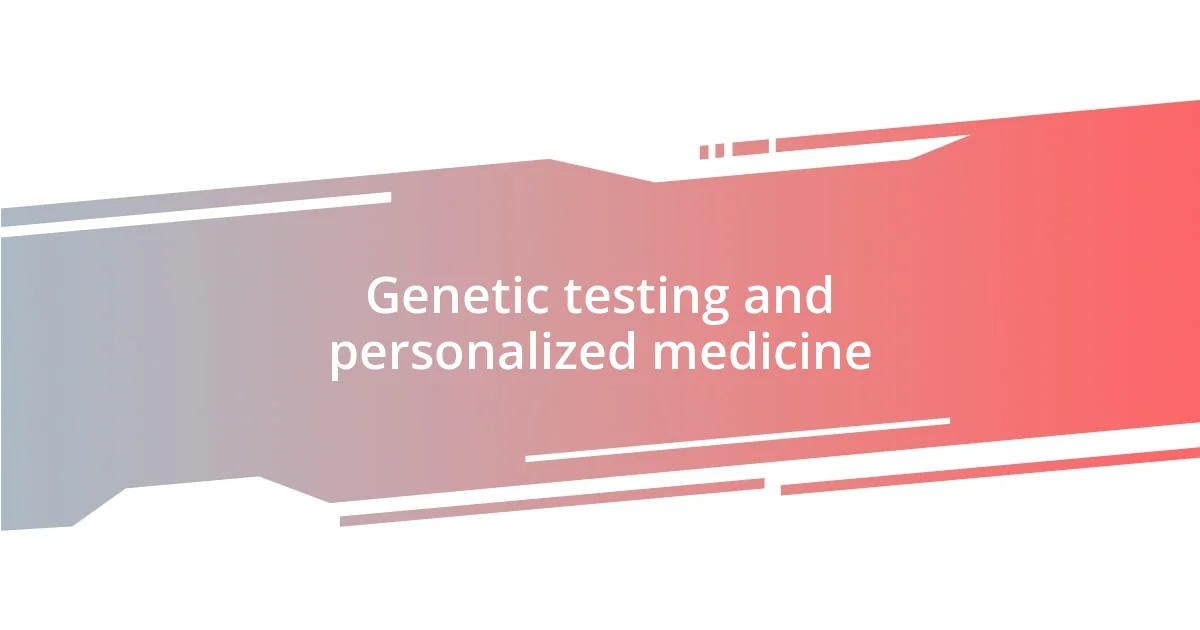
Genetic testing and personalized medicine
The world of genetic testing is evolving rapidly, leading to breakthroughs in personalized medicine that truly excite me. Just a few weeks ago, a doctor friend shared an inspiring case where targeted therapies were developed based on genetic profiles. It made me reflect on how knowing your unique genetic makeup could change the way we approach diseases. Wouldn’t it be incredible if treatment plans were tailored to each individual, enhancing their chances of success?
In my own experiences, I’ve seen firsthand how genetic testing can empower patients. A colleague recently underwent testing that revealed a predisposition to a certain type of cancer. At first, the results were overwhelming and brought forth a wave of anxiety. But with the help of a personalized health strategy aligned with his genetic data, he felt more in control of his health. This experience underscored how genetic information can be a double-edged sword; while it can create fear, it can also offer a pathway to proactive health management.
Furthermore, I believe the accessibility of genetic testing is crucial for its impact on society. I once participated in a community health workshop where free genetic screening was offered. The joy and relief on people’s faces after understanding their genetic risks showed me the transformative power of knowledge. It made me ask myself: how many lives could be saved if genetic testing became a standard practice? Personalized medicine based on genetic testing has the potential to revolutionize healthcare, making it more predictive, preventive, and tailored to individual needs.
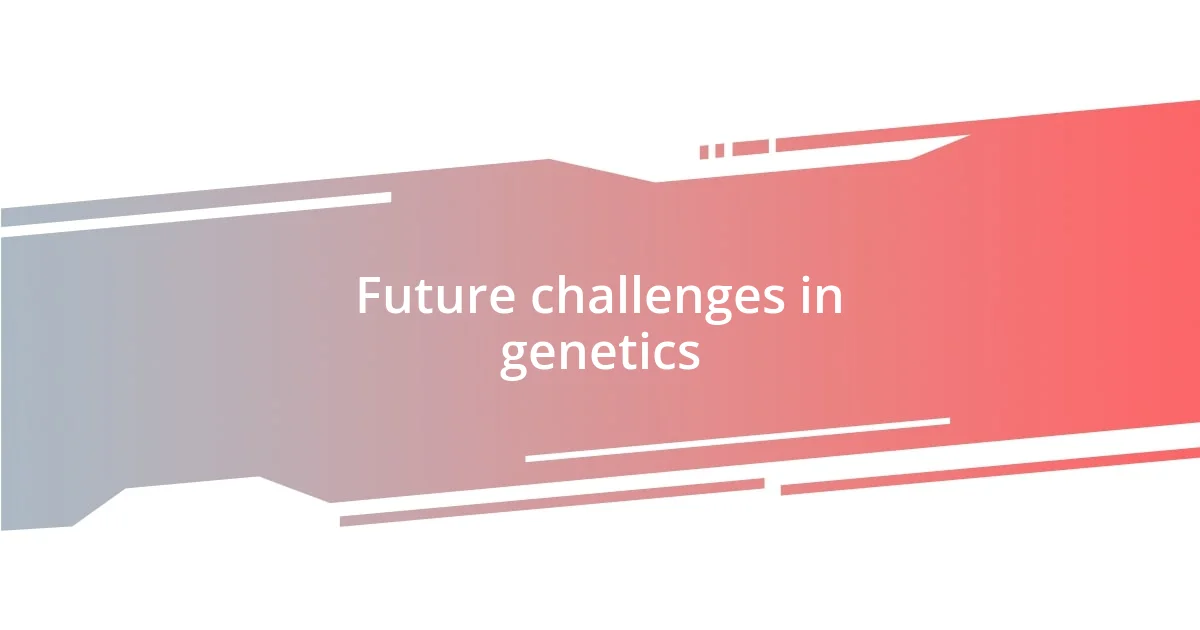
Future challenges in genetics
As we look ahead, one of the prominent challenges in genetics will be ethical considerations surrounding gene editing. I remember a discussion at a conference where experts grappled with the implications of modifying human embryos. It left me wondering: who gets to decide what genetic traits are desirable? This debate is only expected to intensify as technologies become more advanced and accessible.
Another significant hurdle is the equitable distribution of genetic therapies. During a recent conversation with a health activist, she shared the painful reality of disparities in access to cutting-edge treatments. It struck me that while some individuals may benefit enormously from genetic advancements, others might be left behind simply due to their socioeconomic status. How can we ensure that these life-saving technologies are available to all, regardless of their background?
Lastly, data privacy poses a complex challenge in the future of genetics. When I consulted with a bioethics expert, we explored how genetic data could be extremely sensitive. I couldn’t help but think about the potential for misuse. If organizations could access our genetic profiles, how safe would our private information be? Ensuring that genetic data is protected while fostering innovation will require careful navigation, which is something we must proactively address as a society.










